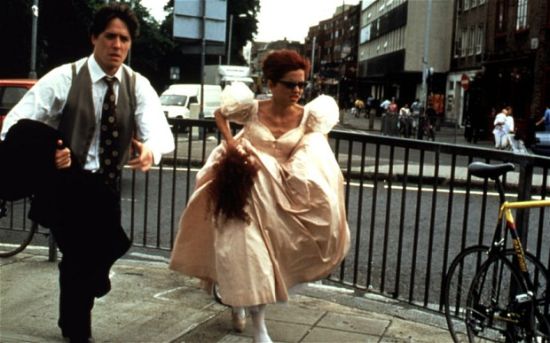你真相了:教你读懂英式礼貌背后的真心话
 电影《四个婚礼和一个葬礼》中的休·格兰特是英式礼貌的典型。 Rex Features 摄
电影《四个婚礼和一个葬礼》中的休·格兰特是英式礼貌的典型。 Rex Features 摄Ever been told by a new neighbour ‘You must come for dinner’ then spent weeks waiting for a follow-up invitation that never arrives?
曾经遇到过新邻居对你说“你得过来吃个晚饭”,可几个礼拜后邀请迟迟不来?
Or been thrilled when the boss said he’d bear your ‘very interesting’ idea in mind and been surprised when it was never mentioned again。
或者是激动地听到上司说他会记住你“非常有趣”的想法,却惊讶他再也没提过这件事?
Then you’ve been victim of the uniquely British trait of being too prim and polite to say what we really mean. And if it can be baffling for us, imagine what it must be like for foreigners who take our every word at face value。
那你就是拥有独特特征的英式英语的受害者了,英式英语对于表达真实所想来说太过拘谨、礼貌了。其实对于英国人来说,想想外国人可能会把他们的每句话信以为真,也挺令人困扰的。
Now there’s help in the form of a translation table which has become a huge hit on the internet。
现在这里有一张在网上引起热议的翻译表,能对你有所帮助。
|
英国人说的 |
英国人实际表达的 |
WHAT OTHERS UNDERSTAND 别人所理解的 |
|
I hear what you say 我听到你说什么了 |
I disagree and do not want to discuss it further 我不同意也不想继续讨论下去了 |
He accepts my point of view 他接受了我的观点 |
|
With the greatest respect 怀着最高的敬意 |
You are an idiot 你是一个白痴 |
He is listening to me 他在听我说 |
|
That's not bad 那不算坏 |
That's good 不错 |
That's poor 那很差劲 |
|
That is a very brave proposal 这是一个非常勇敢的提议 |
You are insane 你疯了 |
He thinks I have courage 他认为我很有勇气 |
|
Quite good 真不错 |
A bit disappointing 有一点令人失望 |
Quite good 真不错 |
|
I would suggest 我认为 |
Do it or be prepared to justify yourself 按我认为的去做或证明你的想法 |
Think about the idea, but do what you like 考虑他的说法,但按自己想的做 |
|
Oh, incidentally/by the way 哦,顺便提一下 |
The primary purpose of our discussion is 这次讨论的主要目的是 |
That is not very important 那并不是很重要 |
|
I was a bit disappointed that 我对此有点失望 |
I am annoyed that 我被惹恼了 |
It doesn't really matter 没关系 |
|
Very interesting 非常有趣 |
That is clearly nonsense 那简直是胡说八道 |
They are impressed 那令人印象深刻 |
|
I'll bear it in mind 我会记住的 |
I've forgotten it already 我已经忘了 |
They will probably do it 他们大概会这么做 |
|
I'm sure it's my fault 我确信这是我的错 |
It's your fault 这是你的错 |
Why do they think it was their fault? 为什么他们觉得是他们的错? |
|
You must come for dinner 你得过来吃晚饭 |
It's not an invitation, I'm just being polite 这并不是一个邀请,我只是表示礼貌 |
I will get an invitation soon 我很快就会受到邀请 |
|
I almost agree 我差不多同意了 |
I don't agree at all 我根本不同意 |
He's not far from agreement 他差不多同意了 |
|
I only have a few minor comments 我只有一些次要意见 |
Please rewrite completely 请全部重写 |
He has found a few typos 他只找到了一些印刷错误 |
|
Could we consider some other options 我们能考虑下别的选择吗 |
I don't like your idea 我不喜欢你的主意 |
They have not yet decided 他们还没决定 |
It reveals that when a British person begins a sentence ‘With the greatest respect...’, they’re really saying ‘I think you are an idiot.’
表格揭露了当一个英国人用“怀着最高的敬意”为一句句子开头,他们实际想说的是“我认为你是一个白痴”。
‘I hear what you say’ means ‘I disagree and do not want to discuss it further’ while ‘That is a very brave proposal’ translates as ‘You are insane’。
“我听到你说什么了” 代表“我不同意也不想继续讨论下去了”,“这是一个勇敢的提议”代表“你疯了”。
The table, which has been posted on numerous internet blogs, has received thousands of comments acknowledging that it’s spot on–from foreigners and Britons alike。
这张表格被放到许多博客中后,收到许多外国人和英国人本身的赞同,承认这极其正确。
(来源:沪江英语)

